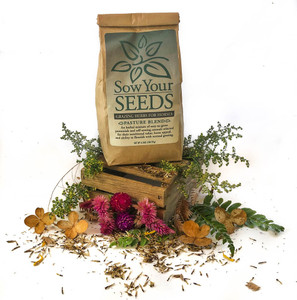
Chia seeds are the most stable and easiest to feed form of Omega 3 fatty acids.
Now with Free Shipping
Abundance and diversity of nutrients
Chia seeds are the highest naturally occurring source of Omega-3 fatty acids, with the proper 3:1 ratio of Omega-3s to Omega-6s. (source)
Chia's oil is 63% Omega-3, greater than flaxseed oil (58%), and menhaden fish oil (29%).
Chia seeds are a rich source of Vitamin B, with a higher niacin content than corn, rice, and even soy. Its thiamine and riboflavin content is similar corn and rice.
Chia seeds are a great source of calcium, phosphorus, magnesium, potassium, iron, zinc, and copper.
Chia seeds contain the mineral boron, which facilitates the absorption of calcium.
How do I feed my horse chia seeds?
Chia seeds can be consumed daily, fed raw (unmilled), and they can be easily mixed in with your horse's feed. Higher daily doses help with digestive issues and colic prevention.
A scoop is 1.8oz (50g) of seeds. Typically, horses will consume 4-5 lb. of seeds per month. We recommended the following feeding schedule for your horse:
Loading: 2 scoops daily
Maintenance: 1 scoop daily
You can safely give more if your horse need additional immune system support, has cancer, Lymes, EPM, Insulin Resistance, Cushings or any other disease with a compromised immune system. In my practice, i often give as much as 4 oz once or twice a day for maximum therapeutic results in immune compromised horses.
Anti-inflammatory properties
Chia's powerful anti-inflammatory properties boost the immune system, can reduce symptoms of arthritis, and aid in recovery from strenuous exercise.
The Omega-3s in chia seeds can ease mare cycles and estrus inflammation, and are essential to the proper development of a fetus's brain and nervous system.
Chia's Omega-3s can reduce the severity and occurrence of laminitis.
Colic and ulcer prevention
Chia seeds are 40% fiber. They have a higher concentration of soluble fiber (27%) than wheat, oats, and flax, and can be used as an alternative to psyllium.
Chia seeds form a mucilage-type gel when exposed to water, which aids the prevention of colic and ulcers by trapping and passing sand and other debris through the digestive system. Chia's water retention (as a mucilage gel) increases its volume by 12X. For comparison, ?psyllium increases by 10X and flax seeds by 6X
Hydrates and retains electrolyte balance
Because chia seeds absorb 12X their weight in water, they keep horses hydrated longer and help retain electrolytes.
Healthier, glossy coat
The Omega-3 fatty acids in chia seeds promote healthy skin and a shiny coat. (source)
Quality protein source
Chia seeds have more protein (19-23%) than wheat (13.7%), rice (6.5%), corn (9.4%), barley (12.5%), and oats (16.9%), and contains the full amino acid spectrum.
Longer shelf-life
Chia is proven to withstand extremes of -20 to 110 degrees F. The natural abundance of antioxidants stabilize the vitamins, minerals and fats.
Chia seeds have a 5-year shelf life without going rancid, unlike corn oil, wheat germ oil, and other fat supplements that can quickly become rancid if exposed to heat, air, or light.
Anti-allergic properties
Chia seeds can help with both summer itch and mosquito hypersensitivity.
Chia seeds can also be used as part of a program to help horses in sandy areas and it may work as well or better than a psyllium product.
Chia seeds have very high levels of Laetrile, which you may have heard of as Vitamin B17, the apricot seed vitamin that helps with cancer



